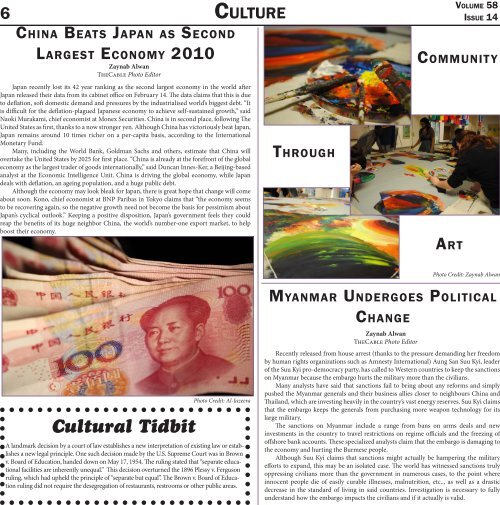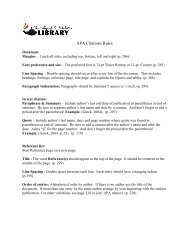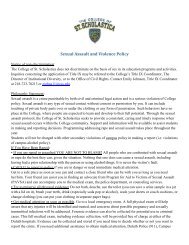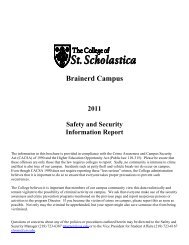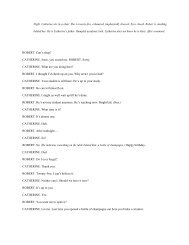Cable - The College of St. Scholastica
Cable - The College of St. Scholastica
Cable - The College of St. Scholastica
Create successful ePaper yourself
Turn your PDF publications into a flip-book with our unique Google optimized e-Paper software.
6<br />
Chi n a be a T s Ja P a n as se C o n d<br />
lar g e s T eC o n o m y 2010<br />
Zaynab Alwan<br />
<strong>The</strong><strong>Cable</strong> Photo Editor<br />
Cu lT u r e<br />
Japan recently lost its 42 year ranking as the second largest economy in the world after<br />
Japan released their data from its cabinet <strong>of</strong>fice on February 14. <strong>The</strong> data claims that this is due<br />
to deflation, s<strong>of</strong>t domestic demand and pressures by the industrialised world’s biggest debt. “It<br />
is difficult for the deflation-plagued Japanese economy to achieve self-sustained growth,” said<br />
Naoki Murakami, chief economist at Monex Securities. China is in second place, following <strong>The</strong><br />
United <strong>St</strong>ates as first, thanks to a now stronger yen. Although China has victoriously beat Japan,<br />
Japan remains around 10 times richer on a per-capita basis, according to the International<br />
Monetary Fund.<br />
Many, including the World Bank, Goldman Sachs and others, estimate that China will<br />
overtake the United <strong>St</strong>ates by 2025 for first place. “China is already at the forefront <strong>of</strong> the global<br />
economy as the largest trader <strong>of</strong> goods internationally,” said Duncan Innes-Ker, a Beijing-based<br />
analyst at the Economic Intelligence Unit. China is driving the global economy, while Japan<br />
deals with deflation, an ageing population, and a huge public debt.<br />
Although the economy may look bleak for Japan, there is great hope that change will come<br />
about soon. Kono, chief economist at BNP Paribas in Tokyo claims that “the economy seems<br />
to be recovering again, so the negative growth need not become the basis for pessimism about<br />
Japan’s cyclical outlook.’’ Keeping a positive disposition, Japan’s government feels they could<br />
reap the benefits <strong>of</strong> its huge neighbor China, the world’s number-one export market, to help<br />
boost their economy.<br />
Cultural Tidbit<br />
Photo Credit: Al-Jazeera<br />
A landmark decision by a court <strong>of</strong> law establishes a new interpretation <strong>of</strong> existing law or establishes<br />
a new legal principle. One such decision made by the U.S. Supreme Court was in Brown<br />
v. Board <strong>of</strong> Education, handed down on May 17, 1954. <strong>The</strong> ruling stated that “separate educational<br />
facilities are inherently unequal.” This decision overturned the 1896 Plessy v. Ferguson<br />
ruling, which had upheld the principle <strong>of</strong> “separate but equal”. <strong>The</strong> Brown v. Board <strong>of</strong> Education<br />
ruling did not require the desegregation <strong>of</strong> restaurants, restrooms or other public areas.<br />
Thr o u g h<br />
Zaynab Alwan<br />
<strong>The</strong><strong>Cable</strong> Photo Editor<br />
Vo l u m e 58<br />
issue 14<br />
my a n m a r un d e r g o e s PoliTiCal<br />
Cha n g e<br />
Com m u n i T y<br />
arT<br />
Photo Credit: Zaynab Alwan<br />
Recently released from house arrest (thanks to the pressure demanding her freedom<br />
by human rights organizations such as Amnesty International) Aung San Suu Kyi, leader<br />
<strong>of</strong> the Suu Kyi pro-democracy party, has called to Western countries to keep the sanctions<br />
on Myanmar because the embargo hurts the military more than the civilians.<br />
Many analysts have said that sanctions fail to bring about any reforms and simply<br />
pushed the Myanmar generals and their business allies closer to neighbours China and<br />
Thailand, which are investing heavily in the country’s vast energy reserves. Suu Kyi claims<br />
that the embargo keeps the generals from purchasing more weapon technology for its<br />
large military.<br />
<strong>The</strong> sanctions on Myanmar include a range from bans on arms deals and new<br />
investments in the country to travel restrictions on regime <strong>of</strong>ficials and the freezing <strong>of</strong><br />
<strong>of</strong>fshore bank accounts. <strong>The</strong>se specialized analysts claim that the embargo is damaging to<br />
the economy and hurting the Burmese people.<br />
Although Suu Kyi claims that sanctions might actually be hampering the military<br />
efforts to expand, this may be an isolated case. <strong>The</strong> world has witnessed sanctions truly<br />
oppressing civilians more than the government in numerous cases, to the point where<br />
innocent people die <strong>of</strong> easily curable illnesses, malnutrition, etc.., as well as a drastic<br />
decrease in the standard <strong>of</strong> living in said countries. Investigation is necessary to fully<br />
understand how the embargo impacts the civilians and if it actually is valid.


